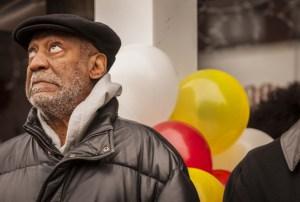 Fifteen women now claim to have been drugged and raped by Bill Cosby. Asked to respond to these allegations on NPR, Cosby maintained an indignant silence.
Fifteen women now claim to have been drugged and raped by Bill Cosby. Asked to respond to these allegations on NPR, Cosby maintained an indignant silence.
The kind of white liberals who love NPR (I am one of these) love Bill Cosby. That is likely why most readers who cared enough to respond sharply criticized Scott Simon for asking a question that was irrelevant to the interview.
Since it is unlikely that Bill Cosby would give an interview specifically related to his alleged sexual violence, it is hard to imagine how Cosby could ever be forced to answer his accusers.
White liberals love Bill Cosby because he represents a racially reconciled America where African Americans, thank God Almighty, finally have their piece of the pie. The Cosby Show portrayed a hyper-functional Black family that listened to Ray Charles and reminisced about the march on Washington, while maintaining a egalitarian marriage, exercising strict family disciple and getting along swimmingly with white people.
As a young adult, I loved the Cosby Show. As a child, I laughed myself silly over Cosby’s stand-up routines: “Noah: How long can you tread water?” Cosby’s blackness was central to my pleasure. Here was a black man who transcended racist stereotype. Cosby was a role model, a walking embodiment of our best values. And he was really, really funny.
That’s why I was so disappointed to hear the sainted comedian unleash a campaign against low-income black people, the folks at the opposite end of the social spectrum from Cliff and Claire Huxtable who failed where Cliff and Claire had succeeded so brilliantly. Cosby’s contempt for black people who neglected their kids, didn’t get an education, who lacked a work ethic, and blamed others for their own failings knew no bounds.
The iconic comedian chose a gala celebration of the fiftieth anniversary of Brown v. Board of Education to launch his campaign against low-status black people. In what is remembered as his “pound cake” speech, Cosby castigated black parents (single black mothers in particular) for letting their social world collapse around them.
Ted Shaw, who had just assumed the leadership of the Legal Defense Fund of the NAACP, a group founded by Brown v. Board hero Thurgood Marshall, followed Cosby on the program. Scrapping his prepared remarks, Shaw talked about systemic injustice. In a Washington Post op-ed published days after Cosby’s rant, Ted Shaw summarized the thrust of his remarks:
I embraced the notion of personal responsibility, at the same time calling attention to problems faced by African Americans that are not self-inflicted.
One example is the now infamous Tulia, Tex., drug sting. With no drugs, no money and no weapons recovered, 10 percent of the black population of this small town was arrested and convicted on the word of one corrupt undercover police officer. The sentences ranged from 20 to 341 years. Only after the Legal Defense Fund and other lawyers represented these individuals in post-conviction proceedings were they released.
I had met Ted Shaw in Tulia a few days before his public confrontation with America’s favorite uncle. Our next meeting was three years later in Jena, Louisiana when another example of systemic injustice brought 50,000 protesters to a tiny community.
Days later, I traveled to Washington DC with several parents whose sons were facing decades in prison for assaulting a white Jena high school student after a weekend of racially-charged attacks on black students. The black kids were facing decades in prison and folks like the Children’s Defense Fund and various groups at Howard University saw the situation in Jena as a living metaphor for systemic injustice.
The night after a noisy and enthusiastic rally at Howard University featuring the Jena families, Bill Cosby was slated to address Howard students. The audience listened respectfully while the iconic comedian presented a dialed-back version of his assault on the people I had worked with in places like Tulia and Jena.
Looking back, I am dogged by a troubling question. Did the same contempt Bill Cosby obviously feels for low-status black people drive his inhuman treatment of the impressionable young women he allegedly drugged and sexually assaulted?
Invariably, these young women reached out to Cosby because they longed to make their mark in the entertainment world and hoped he could help them. In addition, they were likely afflicted with a peculiarly American species of idol worship.
Was it the vast power differential between an established superstar and these aspiring but anonymous women that spurred Cosby’s contempt. He had made it; they had not. Employing the moral logic of Friedrich Wilhelm Nietzsche or Ayn Rand (two perennial American favorites) Cosby may have told himself that these women were fair game.
There are only two consistent moral positions: the universal love of Jesus and the might-makes-right contempt of Nietzsche/Rand. When two roads diverge in a wood, most of us defer and procrastinate. Bill, it appears, made a clear choice.
Some of us are shocked by Mr. Cosby’s alleged sins. Others prefer to believe that his accusers are spinning fancies. How could Heathcliff Huxtable do such a thing.
It’s simple, Heathcliff Huxtable was just one of many roles Bill Cosby has been paid, very handsomely, to play.
A mean-spirited disregard for people lacking power, social agency, political clout or financial resources, is a prominent feature of mainstream American culture. We applaud Cosby’s pound cake sermon because it excuses, even justifies, our contempt for those who haven’t found a seat in the American game of musical chairs.
A mythical Cliff Huxtable symbolized how far we have come; an all-too-real Bill Cosby reminds us how far we have strayed from the kingdom.
